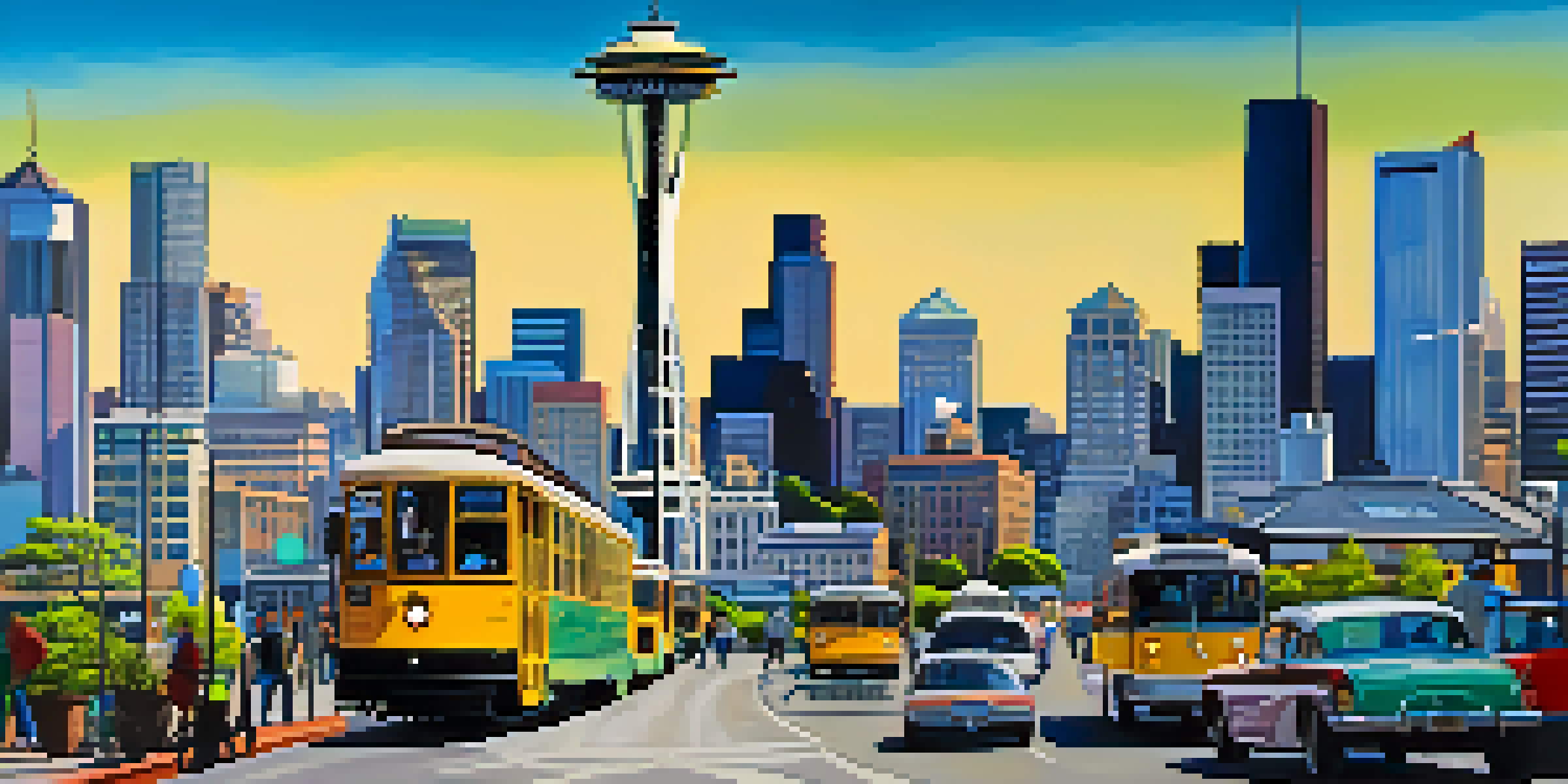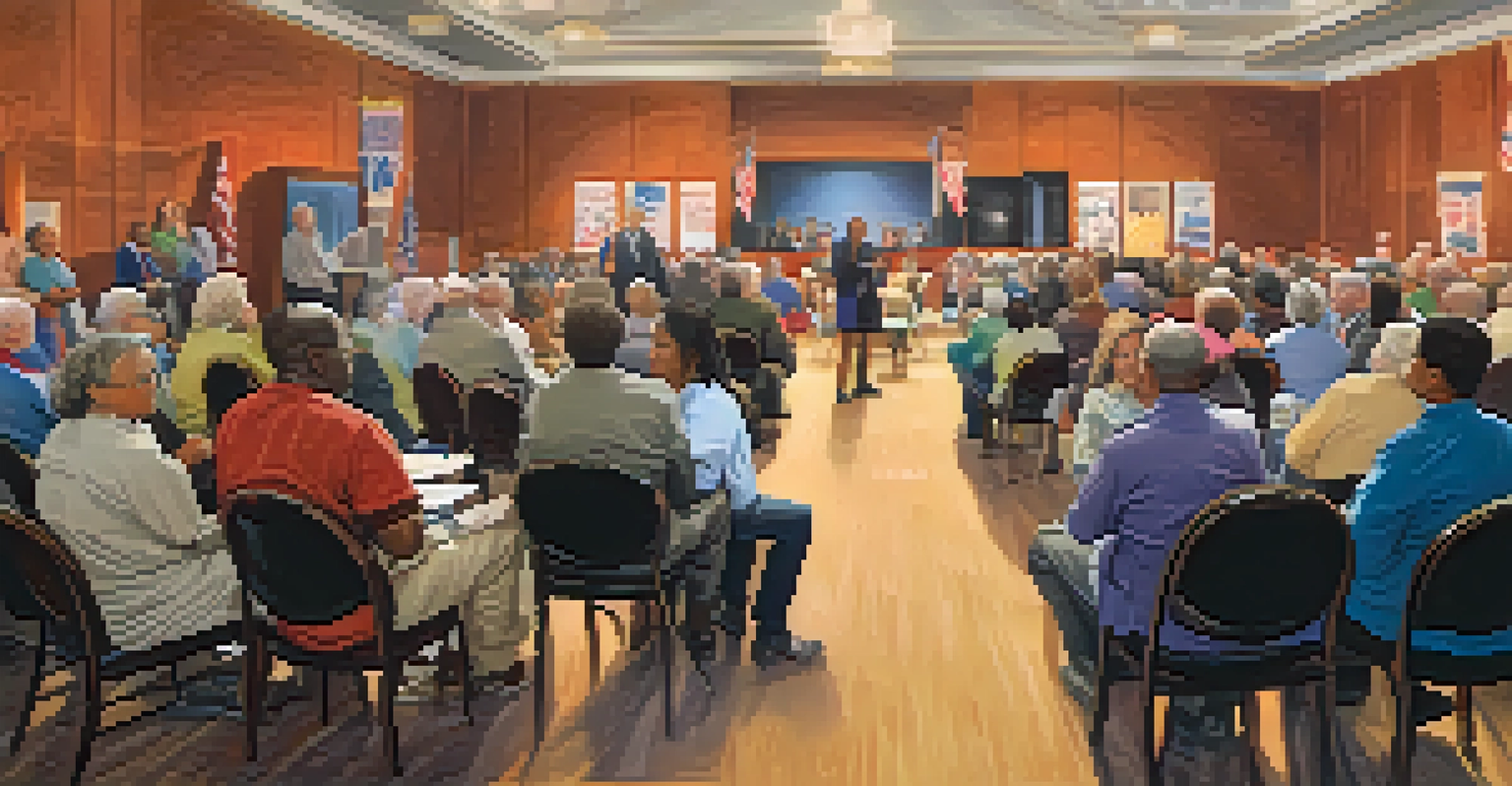Political Parties and Their Influence in Washington State

An Overview of Political Parties in Washington State
Washington State boasts a diverse political landscape, primarily dominated by the Democratic and Republican parties. Each party plays a crucial role in shaping the policies and governance of the state. Additionally, smaller parties, such as the Green Party and Libertarian Party, also contribute to the political dialogue, advocating for issues that may be overlooked by the major parties.
In a democracy, the people get the government they deserve.
The Democratic Party tends to focus on social justice, environmental sustainability, and healthcare reform, resonating with many urban voters. In contrast, the Republican Party often emphasizes fiscal conservatism, individual freedoms, and a strong stance on law and order, appealing to a more rural demographic. This juxtaposition creates a dynamic political environment where various viewpoints compete for attention.
Understanding this landscape is essential for grasping the nuances of political influence in Washington. It’s not just about who holds office; it’s about how these parties interact with constituents, lobbyists, and various interest groups to shape the laws and policies that affect daily life in the state.
The Role of Political Parties in State Elections
Political parties play a pivotal role in state elections, acting as the backbone of campaign efforts for candidates running for office. They organize primaries, which determine the candidates that will appear on the general election ballot, significantly influencing the political direction of the state. For instance, the Democratic Party's endorsement can be a game-changer for a candidate, providing them with essential resources and support.

Moreover, parties mobilize voters through grassroots campaigns, phone banking, and door-to-door canvassing, ensuring their platforms reach as many people as possible. This engagement is particularly important in a state like Washington, where voter turnout can vary widely between urban and rural areas. By energizing their base, parties aim to increase participation and secure victories in key races.
Diverse Political Landscape in WA
Washington State's political scene is mainly shaped by the Democratic and Republican parties, alongside smaller parties that contribute to the political dialogue.
The influence of parties extends beyond just elections; they also shape public opinion and policy agendas. Through debates, media appearances, and social media campaigns, parties can highlight specific issues, making them central to the political conversation in the state.
Influence of Political Parties on Local Governance
Local governance in Washington is heavily influenced by the prevailing political parties, affecting everything from city councils to school boards. Political affiliations often dictate the priorities and policies of local governments, which can lead to significant differences in how services are delivered to residents. For instance, a city led by a Democratic majority may prioritize affordable housing and public transportation, while a Republican-led city might focus on tax cuts and reducing regulations.
The best way to predict your future is to create it.
Moreover, local party organizations play a crucial role in supporting candidates for municipal offices, providing them with the necessary tools and networks to succeed. These organizations often hold events, fundraisers, and training sessions to empower local leaders, reinforcing party values at the grassroots level. This localized support can be a difference-maker in tightly contested races.
As such, the impact of political parties on local governance cannot be underestimated. They not only influence who gets elected but also how policies are implemented that directly affect the daily lives of Washington residents.
The Impact of Political Parties on Policy Making
Political parties significantly influence policy making in Washington State, particularly through their legislative agendas. Each party pushes for specific policies that align with their core values, shaping laws that govern everything from environmental protection to healthcare access. For instance, the Democratic Party often advocates for progressive taxation and climate change initiatives, while the Republican Party may focus on deregulation and business incentives.
This ideological divide can create challenges in the legislative process, particularly when parties hold differing majorities in the state legislature. Compromise is often necessary, leading to negotiations that can dilute initial proposals or result in bipartisan efforts. Understanding these dynamics is essential for anyone looking to grasp how laws are formed and enacted.
Parties Influence Elections & Policy
Political parties play a crucial role in state elections and policy making, driving voter mobilization and shaping legislative agendas.
Ultimately, the interplay between different political parties in the policy-making process demonstrates the importance of representation and diverse viewpoints in crafting effective legislation. The outcome of these negotiations can have lasting implications for the residents of Washington State.
Grassroots Movements and Their Relationship with Political Parties
Grassroots movements in Washington State often align with political parties to amplify their messages and advocate for change. These movements, whether focused on social justice, environmental issues, or political reforms, rely on party support to gain visibility and influence. For example, the Fight for $15 campaign, advocating for a higher minimum wage, received significant backing from local Democratic organizations, helping to propel the issue into mainstream politics.
However, this relationship can be complex, as grassroots movements sometimes push parties to adopt more progressive stances. Activists may find that their goals are not always aligned with the established party platforms, leading to tensions. This dynamic can drive parties to evolve, adapting their policies to better resonate with their constituents' needs and values.
Ultimately, the collaboration between grassroots movements and political parties illustrates the fluid nature of political influence. It showcases how citizen engagement can shape party agendas and drive meaningful change in Washington State.
The Future of Political Parties in Washington State
As the political landscape continues to evolve, the future of political parties in Washington State is likely to be influenced by several factors, including demographic shifts and changing voter priorities. With an increasingly diverse population, parties may need to broaden their appeal to remain relevant and competitive. This could lead to the emergence of new parties or more significant shifts within existing ones, particularly as younger voters become more engaged.
Technology is also playing a crucial role in reshaping the political landscape. Social media platforms and digital campaigning are becoming essential tools for parties to connect with voters, especially during elections. Those who can effectively harness these tools may find themselves at a significant advantage, altering traditional campaign strategies.
Grassroots Movements and Adaptability
Grassroots movements often collaborate with political parties to amplify their causes, influencing party platforms and fostering political change.
Looking ahead, the adaptability of political parties in Washington State will be key to their survival and influence. Parties that can embrace change and respond to the evolving needs of their constituents are more likely to thrive in this dynamic political environment.
The Role of Political Parties in Civic Engagement
Political parties play a vital role in fostering civic engagement among Washington residents. By organizing events, town halls, and forums, they create opportunities for individuals to voice their opinions and participate in the democratic process. This engagement is crucial for building a well-informed electorate that feels empowered to contribute to discussions about policies that impact their lives.
Moreover, parties often provide resources and training for citizens interested in getting involved in local governance or running for office themselves. This support helps demystify the political process and encourages more diverse candidates to step forward. The involvement of various voices can lead to a richer political discourse and more representative governance.

In essence, the relationship between political parties and civic engagement is symbiotic. As parties work to mobilize and educate voters, they also help cultivate a culture of active participation that strengthens democracy in Washington State.